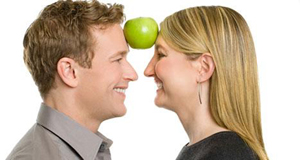
Five years after launching the 100-Mile Diet in Vancouver, what do its authors Alisa Smith and James MacKinnon think should go next on our menu of local food actions? After touring North America in the wake of their bestselling book, what local food experiments have they found most inspiring?
Find out by attending a very special edition of the Museum of Vancouver's Food and Beers series on Nov. 25, when Smith and MacKinnon share their top local food ideas being tried in other cities that could easily sprout and thrive in the Lower Mainland of British Columbia.
The pioneering locavore couple are returning home from their current base in New York state's Hudson Valley to share their insights as part of an exhibit and broad range of programming around local food at the Museum of Vancouver.
"The local food movement has taken off, and now there's an opportunity to take it deeper," MacKinnon says. "We'll be talking about some of the directions it might go next, and some of the projects we've seen that are going there."
"This won't be a policy primer, though," says Smith. "We're looking at real people who are creating new local food traditions and tapping into old ones."
Listen, chat, chew
This is the third of four Food and Beers evenings at the museum, and it promises to be not only satisfying intellectually but deliciously fulfilling as well. Guests will nosh on a wide assortment of local, sustainably sourced goodies as they listen to the presentation by Smith and MacKinnon, followed by a conversation with yours truly, and questions from the audience.
After the 100-Mile Diet series was first published (right here on The Tyee) in June of 2005, it was exciting, MacKinnon says, to travel the continent and sense the local food movement exploding.
"I remember when we were looking for an American publisher for our book, and in one meeting a woman said, 'This might be interesting out on the West Coast, but it would be impossible to eat this way in New York.' No one would say that now -- you could easily eat a totally local diet in New York City, or even a vegan locavore diet. That's an incredible shift in just five years," he says.
"At the same time," adds Smith, "local food isn't some urban fad. One of the areas we've been invited to the most is the American midwest. Most touching for me was when we were chosen as the community book for Alliance, Ohio. Think of the worst of industrial agriculture --1,000-acre soy bean farms where the farmer can't feed his or her family on the income. They had seen the downsides and wanted out."
And now MacKinnon and Smith are coming back to their home city to deliver a challenging message. When it comes to building a thriving local food economy, "Vancouver is definitely a leader -- but it isn't the leader," says Smith. "We can always take inspiration from other places. It might surprise people to learn, for example, that Michigan is doing more winter farming than Vancouver, or that people in Manhattan have better access to farmers' markets. Vancouver was a pioneer, but some other places have changed more quickly."
Taste of what's to come
Asked for a glimpse of what could be emulated in the Vancouver area, Smith says, "We need to move quickly to make cities places that make a real contribution to the food supply. This is all 'lost' farmland to number-crunchers right now, and we will prove that cities can be far more locally self-sufficient than they believe. Vancouver has a good civic attitude and good growing conditions, so all we need is more people actually acting on this. Let's grow more food in the winter too."
Adds MacKinnon, "I'd like to see Vancouver take the lead in making local food more accessible to people with less money to spend, and -- just as importantly -- to keep it from getting priced out of reach for people who buy it today. That is already happening in some places, because the demand for local food is outstripping the supply. Changing the supply side of the equation demands a bigger commitment from governments at every level from protecting agricultural land to supporting small farms."
Previous Food and Beers events at the Museum of Vancouver included a 100-Mile Iron Chef challenge with culinary aces duelling over hot grills to craft masterpieces from sumptuous local ingredients, and a blue ribbon panel of local food distributors, processors and preparers discussing how to get more local food onto store shelves and restaurant plates.
Next up, when the 100-Mile Diet inventors take the stage, you won't want to miss the inspiring examples of flourishing food initiatives they will be serving up.
To order tickets in advance click here.
The Food and Beers series is part of the The Museum of Vancouver fall exhibit, Home Grown: Local Sustainable Food, co-presented by FarmFolk/CityFolk. The Museum of Vancouver's Food and Beers events are sponsored by the Tides Canada Foundation. ![]()
Read more: Food, Environment















Tyee Commenting Guidelines
Comments that violate guidelines risk being deleted, and violations may result in a temporary or permanent user ban. Maintain the spirit of good conversation to stay in the discussion.
*Please note The Tyee is not a forum for spreading misinformation about COVID-19, denying its existence or minimizing its risk to public health.
Do:
Do not: